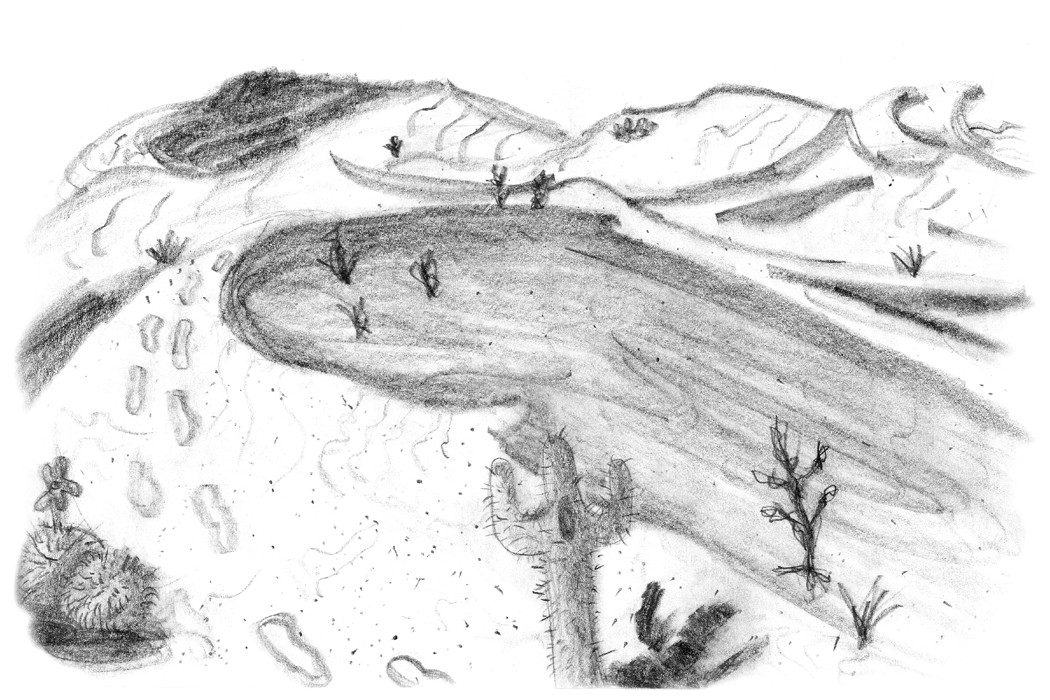Chapter 34: The Last Stop
“What shape is Manessa when we fly?” Sata asked as she sent the flight plan to the pilot.
“It depends on our speed and the density of whatever we’re flying through,” Ilika explained. “In air, usually a thin, low-friction shape.”
“Anti-mass and thrusters, level one?” Boro proposed.
“It’s a long flight, and then we’ll be in the mountains. I suggest level two on both engines. Your call, pilot.”
Mati’s eyes became wide. “I’m new, remember!”
Boro smiled. “Warming-up.”
Ilika
grinned.
“Is that treasure box of yours secure somewhere, Rini?” Kibi asked.
“I strapped it into a passenger seat.”
“As you probably all saw,” Ilika began as he took the command chair, “a heavy overcast cloud layer is developing, and it’s probably worse in the mountains. When we’re in it, you’ll be flying by your topographic information, Mati. In bad weather, trust your instruments. Turn off your visual displays if they’re confusing.”
The pilot nodded.
“Weather map coming out,” Rini announced. “The clouds are thickening fast.”
“Landing site, hatch, and ship are secure,” Kibi reported.
“Flight objective is the monastery,” Ilika began, “that level field right in
NEBADOR Book Three: Selection 258
front of the main building, if it’s clear.”
Mati could feel the extra power in both her lift and thrusters, and a minute later they entered the clouds. She discovered her captain was right — the white mist was rapidly making her dizzy, and had to go.
Everyone was quiet for the next few minutes.
After studying the chart and watching the ship’s position indicator, Sata announced, “The remains of Lumber Town are below us and a little to the left.
I wonder if they’ll rebuild . . .”
“Lots of people there were loggers and sawyers,” Boro remembered.
“I bet Misa will go back someday to look for her parents,” Rini mused.
“Maybe after Buna finds Noni.”
The quiet hum of the engines continued. Ilika wore a contented look.
“We’re entering the mountains,” Mati announced as she gained altitude to follow the flight plan.
A minute later, they suddenly burst through the top of the clouds into bright sunshine with a vivid blue sky overhead. Hearing sounds of delight from everyone else, Mati selected her visual displays again. She glanced back and forth from the forward view to her chart until she knew which mountain was which.
Ilika stepped to the watch station. “We’re looking for a wooden building in a cloud, so we’ll need high-resolution topographics.”
Rini watched as Ilika demonstrated the procedure, then nodded and took over.
“We’re getting close,” Ilika said, keeping an eye on Sata’s chart and going to the pilot’s chair. “Time to slow down, Mati.”
“Okay . . . and we’re back in the clouds.” Mati tapped her display selector until she found the high-resolution chart.
“Flight plan off, Sata,” Ilika ordered. “It can’t get us any closer. We’ll have to find the exact spot by Rini’s sensors and our memories. As soon as we go over the next ridge, Mati, swing around and approach low and slow from the north.”
“This is great!” Mati declared. “I can make out individual rocks and trees!”
“Everyone, help look for buildings or trails,” Ilika requested. “Kibi, scan for people and large animals.”
NEBADOR Book Three: Selection 259
“Bingo!” she said a moment later. “Several animals, goats I think, in a shed, almost directly below us.”
“I see it,” Mati confirmed. “So the monastery should be uphill?”
“Yeah,” Boro remembered. “All their animal sheds were downhill from the main hall, except where they put Tera.”
The fond memory of her faithful donkey colored Mati’s thoughts for a moment. “I see a barn!”
“Two people in it,” Kibi announced, “and about seven more on the very edge of my screen.”
“Try your visual, Mati,” Ilika said.
Though still very white and misty, the faint outline of a structure, about three stories high, started to appear. She compared that to her three-D
projection. “Got it! The main hall is directly ahead.”
Ilika studied the pilot’s display from just behind her chair. “Looks like they’ve had some snow. The field looks clear of people and animals. Can you confirm that, Kibi?”
“Yeah. The people are all in the buildings.”
“Land by instruments, Mati. Don’t trust your visual when everything is just shades of white.”
“Okay. I hope Manessa doesn’t mind cold toes. Getting close . . . struts down. The Manessa Kwi has come to the monastery.”
“Engines
off.”
Boro confirmed, then added, “I wonder what they’ll think of us . . .”
Ilika smiled. “I think we’ll have a better reception than we did near the capital city.”
Everyone laughed at the painful memory of priests trying to burn their ship.
During the long evenings that followed that eventful day, the nine sisters staying over the winter added a complete description of the Blessed Event to the record books of the order.
They told of how the Heavenly Chariot descended from the sky in all its shining Glory, and then gave birth to six Angels, one of whom was wounded from her battles with Evil and walked with a crutch. The novice Kali
NEBADOR Book Three: Selection 260
recognized the Angels first, and found the courage to go out and greet them, silently inviting them in to warm and nourish themselves. A priestess soon recognized them as some of the strangers who had visited the monastery the summer before, had willingly meditated with the sisters in the guest house, and had joined them for the Aurora Festival, the first visitors to be so honored in living memory.
The record was clear that the Angels respected the order’s rule of silence, but that good feelings and affection were freely shared with the novice they knew, and anyone else who found the courage to approach. They partook of tea and stew, and left a box of fruit from Heaven itself, fruit that had never been seen in the world before. That fruit, used sparingly, lasted the entire winter and brought unusually good health to all the sisters.
Finally the Angels, with gestures and embraces, indicated that they had to return to the Chariot and depart. The novice walked with them as far as they would allow, and the other sisters watched from the edge of the ritual field.
The Heavenly Chariot ascended back into the clouds in Power and Glory.
During the year that followed, the novice Kali was quickly taught all the lessons, and advanced to the status of full priestess long before other novices her age.
Ilika slowly and carefully guided their departure from the monastery ritual field, knowing his crew members were experiencing deep feelings after visiting Kali and the sisters again.
He went from station to station. Kibi had tears on her face, but was smiling, and hadn’t missed any of her tasks as steward. Ilika remembered that the plan to refer Kali to the monastery had been her idea.
“Ilika, if we get to go around doing wonderful things like helping Kali, then I never want to leave the Transport Service.”
He spoke so they could all hear him. “We will often get to do wonderful things. We will also have to do many routine things that aren’t so rewarding.
But remember, even when we offer to help people, they will not always accept our help. Sometimes they will choose a different path, and we will have to respect that choice.” He looked at Kibi to see her reaction.
She nodded with understanding.
NEBADOR Book Three: Selection 261
“We’re breaking through the clouds and are back on the flight plan,” Mati announced. “Objective?”
“We need a nice, clear alpine lake, preferably on our course.”
Sata peered at the chart on her display. “No problem. Not far from here.”
“I see it on my three-D,” Mati confirmed.
“Slow and careful instrument flying, Mati. Come to a hover just above the middle of the lake.”
As Mati maneuvered the ship to the lake, Ilika showed Kibi how to fill the water tanks. “Here are your siphon and pump controls, and this is basic filtration, which should be all it needs.”
Kibi
nodded.
Just then, the ship slipped below a cloud ceiling not far above the lake.
Mists crept about, and snow covered the rocks and grass right down to the water’s edge.
Rini gazed at his visual display with round eyes. “Pretty!”
Mati moved the ship into position above the surface. “How’s that?” the pilot asked.
“Lock flight controls. Siphon down, Kibi. All three tanks.”
Soon their water tanks were filled with some of the purest water on the planet, and they were back in the sunshine above the clouds.
Ilika sat down in the command chair. “The next and last leg of our flight plan takes us out of this kingdom . . . out of your kingdom . . . with no reason to return in the near future. We will all leave people and memories behind.
Those who are friends, like Sata’s family and Kali, we will try to see again someday, but I cannot promise exactly when. It could be a year or two before we can return. Nor can I promise we will find them, or that they’ll even be alive. As you know, life holds many dangers for everyone.
“You have now had a small sampling of what it is like to be the crew of a deep-space response ship. Tomorrow, if you choose to remain, we will begin thorough training in all aspects of your jobs on the Manessa Kwi, and in the many things you need to know to become citizens of Nebador.
“You are not slaves. You can only do this of your own free will.”
A long silence followed.
NEBADOR Book Three: Selection 262
“Count
me in!” Mati said with a grin.
“Me too!” Rini echoed.
“You couldn’t pry me away,” Boro asserted firmly.
“I go where you go!” Kibi said with a romantic tinge to her voice.
Sata took a deep breath. A part of her longed for her mother’s hugs and the satisfaction of working with her father at the inn. Another part of her knew she had to find her own path. For a moment the two sides were evenly balanced, and she sat frozen with indecision.
Then she looked around and saw her dear friend Mati, Ilika her teacher and captain, mysterious Rini, Kibi looking down on them from the steward’s station like a mother hen, and finally Boro — sweet Boro, the boy she liked, the boy who had already turned down another offer so he could stay with Ilika
— and with her. He wore an expectant half-smile.
“I think . . . this is where I’m supposed to be!” Sata announced with a little fear and lots of faith.
Everyone
clapped.
“All stations, check flight readiness,” the captain ordered.
They all quickly went over their basic diagnostics and status checks.
“Flight objective,” he continued, “last leg of the flight plan, passing over the eastern boundary of this kingdom, and landing among the sand dunes in the deep desert.”
Mati pushed her flight control forward, and silently promised that since Sata had given up family to be on their crew, she would always be a faithful sister to her younger friend.
The desert, with a clear sky overhead, was receiving its last few minutes of daylight before the sun sank into the clouds on the western horizon. The shiny sphere circled the huge expanse of sand dunes, looking for just the right place to land. It kept some distance from the trail that skirted one side of the dunes, even though not a soul was to be seen.
Eventually it chose a secluded little niche where some hearty cactus plants grew among the tallest dunes, far from anywhere that a person or animal would choose to be, except perhaps a snake or lizard.
It settled onto the ground, careful to not crush the plants.

NEBADOR Book Three: Selection 263
Four people came running out, climbed the nearest dune, and danced for joy in the warm light of the setting sun. Two others came more slowly, one with a stick.
They would never forget the land that had given them birth, but neither did they have any intention of letting those memories keep them from the adventures that lay ahead.
Deep Learning Notes
Since a map or chart is a view from above, and we usually look ahead, there is about a 90° difference in viewing angles. Mati instinctively matched up the mountain peaks she could see ahead of her with those on her chart. You can practice this same skill from any viewpoint or hilltop if you have a map of the countryside you are seeing. It is often much harder than you might think.
Most aircraft instrument landings are similar to the arrival of the ship at the monastery. First, “outer markers” are identified with instruments. Next,
“inner markers” tell the crew they are very close. Radio navigation aids are usually involved, but weren’t available in the story. Once the aircraft is close enough to visually see the “runway” in most weather (usually 400-800 feet above ground level), the pilot will make the decision to land or not. In the
NEBADOR Book Three: Selection 264
story, the ship could land by instruments alone if necessary, but most of our aircraft cannot. A “zero-zero” landing (cloud ceiling zero, visibility zero) is only possible with very modern instruments and radio navigation aids.
The record of the ship’s visit to the monastery was from the point of view of medieval nuns. How is it similar to the speeches given earlier by the high priest? How is it different? What, in your opinion, could cause different groups of people to react so differently to the same ship?
Why would Ilika ask them to do their jobs while “feeling deeply”?
Most sources of biological pollution (disease germs that can harm us) are from people and domestic animals. Most sources of chemical pollution are human activities, especially in cities. An alpine lake in the wilderness, far from and above (in the hydrological cycle) most people and domestic animals, is probably the purest drinking water on the planet.
By asking his new crew members to verify again that they wanted to be on his crew, what risk was Ilika taking? What risk would he be taking if he did NOT
ask them?
Who was at Mati’s side when she emerged from the ship?

About the Author
Born in the Mojave Desert, J. Z. Colby now lives and writes deep in a forest of the Pacific Northwest.
He has studied many subjects, formally and informally, including psychology, philosophy, education, and performing arts, but remains a generalist. His primary profession as a mental health therapist, specializing with families and young adults, gives him many stories of personal growth, and the motivation to develop his team of young critiquers and readers.
All his life, he has been drawn toward a broad understanding of human nature, especially those physical, emotional, mental, and spiritual situations in which our capacity to function seems to reach its limits. He finds fascinating those few individuals who can transcend the limits of our common human nature and the dictates of our cultures.









